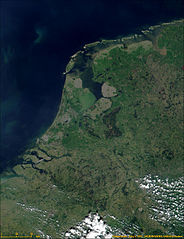 |
| Serge Melki/Wikimedia Commons |
Tuesday, April 23, 2013
Wall Street Pathology & Jeffrey Sachs
Tuesday, April 9, 2013
Dutch Economy Falling Behind Germany (part 2)
 |
| The Netherlands (Wikimedia) |
"The Netherlands, Berlin's most important ally in pushing for greater budgetary discipline in Europe, has fallen into an economic crisis itself. The once exemplary economy is suffering from huge debts and a burst real estate bubble, which has stalled growth and endangered jobs.
"Underwater" is a good description of the crisis in a country where large parts of the territory are below sea level. Ironically, the Netherlands widely viewed as a model economy, is facing the kind of real estate crisis that has only affected the United States and Spain until now. Banks in the Netherlands have also pumped billions upon billions in loans into the private and commercial real estate market since the 1990s, without ensuring that borrowers had sufficient collateral.
.....More than a decade ago, the Dutch central bank recognized the dangers of this euphoria, but its warnings went unheeded. Only last year did the new government, under conservative-liberal Prime Minister Mark Rutte, amend the generous tax loopholes, which gradually began to expire in January. But now it's almost too late. No nation in the euro zone is as deeply in debt as the Netherlands, where banks have a total of about €650 billion in mortgage loans on their books.
Thursday, April 4, 2013
It's 2013: Time to Abolish the Dutch Monarchy?
 |
| Queen Beatrix (Frozenimage/CreativeCommons) |
Some time ago I reported on the upcoming abdication of the Dutch Queen Beatrix after 30 years as Queen of the Kingdom of the Netherlands and its' head of state. She will be resigning on April 30, 2013. April 30 has been celebrated annually as Queen's Day, celebrating the Queen's birthday - and the original birthday of Queen Beatrix' mother, the former Queen Juliana. Queen Beatrix will be succeeded by Prince Willem-Alexander, who will be the first King of the Netherlands in 123 years. The Queen and the Dutch Royal family are generally very popular and are considered an intrical part of Dutch society, as Dutch as the dykes, Amsterdam, wooden shoes and the Dutch national soccer team. However, different, more critical, opinions about the Dutch monarchy have been expressed. In 1996 the "Republican Society" or "Republikeins Genootschap" was set up, consisting of a number of independent thinkers and well-known Dutch personalities, that supported the restoration of the Dutch Republic from 1581. The Netherlands's history is one of a mercantile republic that only in the 19th century became a monarchy, first in 1806 as the Kingdom of Holland with Napoleon Bonaparte's brother Louis as the King of this "country" which was then part of the French empire. Then in 1815, the Netherlands became the United Kingdom of the Netherlands with (Dutch) William I as its' King, and consisting in the north of the current Netherlands and in the south of the current Belgium. In 1839, Belgium separated and became an independent Kingdom, and the northern part continued as the Kingdom of the Netherlands.
Now in April 2013, a Dutch journalist Max Westerman, a TV correspondent living in the U.S. for 30 years, wrote a controversial article in the Wall Street Journal, calling for the abolishment of the Dutch monarchy. In this article, "It's 2013: Abolish the Dutch Monarchy" he says:
The Rijksmuseum Reopening in Amsterdam
 |
| The Night Watch/De Nachwacht (Wikimedia) |
The Huffington Post reports. The Rijksmuseum is the leading Dutch museum dedicated to art from the Dutch Golden Age, i.e. the 17th century when the Dutch were leading in art, science, trade and military power. If you are visiting the Netherlands, this museum should be part of your itinerary. For some Dutch "nightwatch" fun watch the following video:
Tuesday, April 2, 2013
Stiglitz on Jobs and a Revolution in the Real Economy
 |
| Serge Melki/Wikimedia Commons |
"It has now been almost five years since the bursting of the housing bubble, and four years since the onset of the recession. There are 6.6 million fewer jobs in the United States than there were four years ago. Some 23 million Americans who would like to work full-time cannot get a job. Almost half of those who are unemployed have been unemployed long-term. Wages are falling—the real income of a typical American household is now below the level it was in 1997."
The continued dismal unemployment situation was confirmed by The Wall Street Journal when stating last week that "only 14 of the country’s 100 biggest cities have more jobs than they did pre-2008/2009 recession."
Stiglitz continues:
Subscribe to:
Posts (Atom)